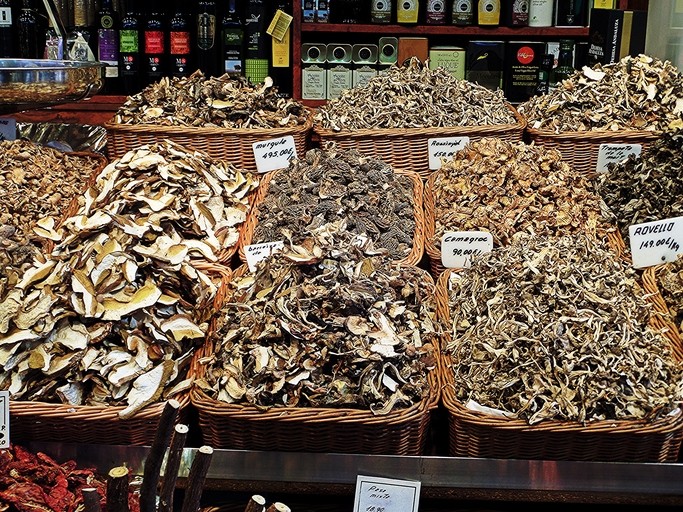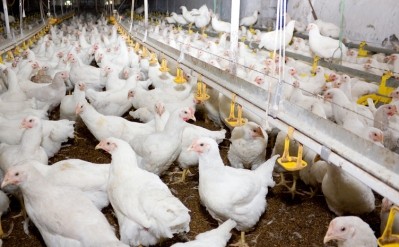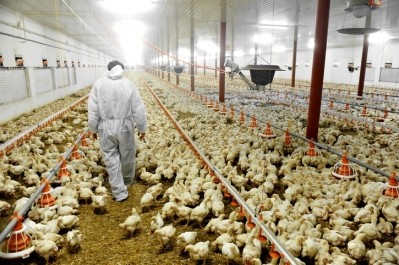Mushroom supplement may boost poultry meat quality

A team of researchers from several academic institutions in Mexico explored the use of a mushroom-based supplement in the diet of farm-raised quail. The group published its work in the journal Livestock Science.
“Given that mushrooms possess antioxidant compounds, the aim of this study was to evaluate the effect of dietary supplementation with P. ostreatus on the growth performance and meat quality of the Japanese quail,” the researchers said.
The research team found that performance indicators for growth, weight gain, feed intake and feed efficiency were similar for birds on the supplemented and control diets. However, there was a positive influence on meat quality and lipid oxidation.
“The results reported in this work showed an increase in meat quality parameters and antioxidant stability of quail breast meat because of dietary mushroom supplementation,” the researchers said. “The inclusion of 10 or 20 g of P. ostreatus/kg in the diet was effective in delaying the lipid oxidation of breasts and enhancing the color, pH, WHC [water holding capacity], CLW [cooking loss weight], and texture.”
Why supplemental mushrooms?
Production of Japanese quail has been expanding, with growing markets in Europe and Latin America, said the researchers. Its short lifespan and inherent resistance to several poultry diseases also have made it of interest for animal research.
“The quail meat is considered an important source of many essential nutrients for human health, including essential amino acids (lysine, methionine, isoleucine, leucine, phenylalanine, threonine and valine) as well as various monounsaturated (palmitoleic, C16:1; oleic acid, C18:1) and polyunsaturated fatty acids (linoleic acid, C18:2; and linoleic acid, C18:3), which are highly susceptible to oxidation processes,” they said. “Oxidative deterioration of polyunsaturated fatty acid (PUFA) in muscles is one of the main causes of quality loss in any type of meat and leads to discoloration, nutrient and drip losses, the formation of toxic compounds and poor shelf life.”
Previously, several synthetic antioxidants have been used to preserve meat, they said. However, regulatory changes are limiting their use in food products.
Past investigations have examined natural antioxidants that could be added to meat or included as feed additives, they said. Some of the products explored include rosemary or sage essential oils and thymol.
Edible mushrooms also could offer a source of bioactive compounds, which have been linked to improved intestinal health in broiler chickens, said the researchers. It has been suggested that different types of mushrooms might limit lipid peroxidation or improve meat quality.
“P. ostreatus is popularly known as the oyster mushroom,” they said. “This common edible fungus is a primary decomposer of hardwoods in North America and, traditionally, has been used to treat various human diseases. Also, P. ostreatus has been demonstrated to possess biological properties, such as immunomodulatory, anti-mutagenic, anti-inflammatory, antilipidemic, hyperglycemic, antibacterial and antiradical function.”
Feeding trial
In the feeding trials, 288 quail chicks were given one of three diets for a period of 35 days, said the researchers.
The experimental diets were corn-soy based, with one diet exchanging 10g/kg corn for a mushroom supplement and another 20g/kg corn for the supplement, they said. The third diet acted as control and had no dried mushroom.
The supplemental mushroom was donated by ATISA, they said.
Feed ingredients were checked for chemical composition, dry matter, total protein, crude fat and crude fiber, they said. They also were checked for amino acid and fatty acid amounts.
Quail were assessed on days 14 and 35 for body weight and feed intake (FI) and the body weight gain and feed efficiency were established, said the researchers. At day 35, weights, live weight at slaughter, carcass weight and yield were collected.
Breast muscle was sampled and refrigerated for 0, 5, 10 and 15 days for observation, they said. Breast color was assessed for luminosity, red index, yellow index, chroma and hue and pH was established along with water holding capacity.
Lipid oxidation was measured and antioxidants in stored meat samples were collected, they said.
Results
There were no mortality incidents recorded for birds during the experiment, the researchers said. Results for growth performance including body weight gain, feed intake, feed conversion ratio, feed efficiency and carcass characteristics, were similar for birds on all three diets.
“No significant differences were observed in moisture 72.7%, protein 22.2% and ash content 1.4%, among the treatments,” they said. “The crude fat content of quail breasts significantly decreased 22.2% in birds supplemented with the edible mushroom when compared with the control group.”
However, there was a treatment and storage time effect found and there was a decrease in the pH of breasts that was greater for the control birds than those getting the supplemented diets, they said. On day 15 of storage, lightness and yellowness increased for the control group and redness dropped when compared to the supplemented birds.
WHC values were increased for the supplemented birds over time, while CLW and texture values were reduced compared to the control group, they said. The supplemented breasts also had reduced MDA (malondialdehyde) on day 15.
“In conclusion, this edible mushroom has the potential for use in the feed of Japanese quail to improve meat quality and to serve as an antioxidant that reduces lipid oxidation during storage,” said the researchers.
Chemical analysis of the mushroom supplement found low moisture, ether extract and ash content, they said. However, it offered a source of crude protein, crude fiber, carbohydrates and nitrogen-free extract.
The supplement also increased total phenolic content and antiradical amounts above the basil diet, they said.
Source: Livestock Science
Title: Effect of dietary supplementation with Pleurotus ostreatus on growth performance and meat quality of Japanese quail
Authors: R. Vargas-Sánchez, G. Torrescano-Urrutia, F. Ibarra-Arias, J. Portillo-Loera, F. Ríos-Rincón, A. Sánchez-Escalante
DOI: doi.org/10.1016/j.livsci.2017.11.015















